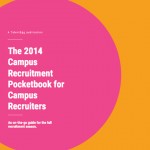Humanization: the act of giving something human characteristics or attributes.
Flesh and bones? Not quite.
“Being human” in the digital age means incorporating aspects of humanity – sense of self, language and emotional intelligence – into the interactions you have with your target audience.
From digital content to social media, the idea is to engage talent in an authentic (re: human) way in order to connect on a deeper, more personal level.
Humanization resonates with Gen Y, who identify with the campus recruiters (and brands) who leverage human elements into their online recruitment strategy. Just take the TalentEgg National Campus Recruitment Excellence Awards as an example – when we ask Gen Y judges to select “Campus Recruiter of the Year,” they consistently choose individuals who expertly put a face to their organization.
For campus recruiters, the implications of this marketing trend are beyond significant: being “human” can help to establish meaningful relationships with highly engaged talent.
Get cracking on your online persona with these elements in mind:
Identity
First things first: in order to “be human” online, you need to figure out who you are. (Don’t worry, it’s not as metaphysical as it sounds.)
Brand identity is an amalgamation of all of the aspects that make you, as an employer, unique: your culture, opportunities, people and perks. As you begin the process of humanizing your online presence, take stock of your redeeming qualities and map out how they relate to your target audience.
Does your organization have an award-winning internship program? Gen Y talent is attracted to quality student programs. International opportunities? Students and grads love to travel. Understanding brand identity in this way can better inform your practice.
“One of the most fantastic aspects of an online campaign is learning more about a brand, beyond the basics. It allows for students to feel connected to the company despite not being an actual employee.”
-Accounting student, York University
Empathy
A major part of being human in the digital age is taking the needs and wants of your audience into account. What kind of information are they after? What do they find helpful? What are they afraid to ask? Students and grads want interesting, useful content: being empathetic can help you deliver just that.
Of course, integrating audience needs and wants into your online strategy requires that you have access to their insight. Social media is a good place to start, but social listening can take up valuable time and energy. Partnering with Gen Y-centric platforms like TalentEgg provides you with the insight you need to guide your efforts and engage talent effectively.
“The fact that recruiters take time to share tips and strategies for recent grads and students is extremely helpful and meaningful. It shows that they are listening to us and really care.”
-Science student, McMaster University
Conversation
Communication is a powerful tool, and being able to communicate effectively online can have a huge impact on your recruitment efforts.
Engaging in “human” conversation helps students and grads feel more comfortable with your organization, so use social media to your advantage. Instead of talking at your followers (only using your profile to post employer-specific information), talk with them! Start an active dialogue by posing career-related questions on Twitter, or sharing external content on your Facebook page. Your recruitment message will always be top priority, but Gen Y appreciates being involved in the conversation.
“The most important part of an online campaign would be giving me the opportunity to lend something to the conversation. If I am not invited to participate, I won’t.”
-Engineering student, University of Waterloo
Discussion: What other human characteristics should brands adopt online?






Leave a Reply
You must be logged in to post a comment.